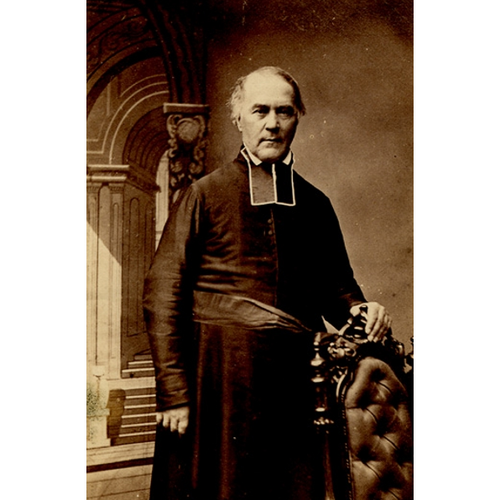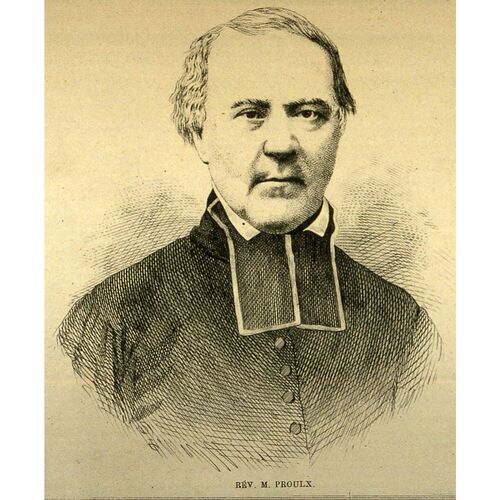PROULX, LOUIS, secular priest, educator, writer, parish priest, and vicar general; b. 10 April 1804 at Baie-du-Febvre (Baieville, Yamaska County), L.C., son of Louis Proulx and Élisabeth Grondin; d. 6 July 1871 at Sainte-Marie (Beauce County), Que.
After completing his classical education at the seminary of Nicolet, Louis Proulx taught from 1826 to 1830 at the seminary of Saint-Hyacinthe, where he even assumed responsibility for the direction of studies and discipline. Meanwhile, on 28 Sept. 1828, he was ordained priest at Boucherville (Chambly County). His wise leadership, as well as his brilliant talents, led his superior at Nicolet, Abbé Jean Raimbault, to send him in 1830 to assist Abbé Charles-François Painchaud*, the founder of the college of Sainte-Anne-de-la-Pocatière, and to restore discipline there; the unskilful leadership given by the famous Abbé Étienne Chartier* had reduced the institution to a state of indescribable chaos. Proulx was successful, but remained there only three years.
He was parish priest of Saint-Pierre-les-Becquets (Nicolet County), also serving Deschaillons (Lotbinière County), from 1834 to 1835, and parish priest of Saint-Antoine-de-Tilly (Lotbinière County) from 1835 to 1847. He was then summoned to the archbishop’s palace at Quebec by Archbishop Pierre-Flavien Turgeon*, to be his adviser and perhaps eventually his coadjutor. Indeed he possessed the qualities necessary in a great bishop, but, as he was also outspoken, opponents ready to divert him from this path were not lacking. In 1850 he was made parish priest of Notre-Dame de Québec, an office which had become vacant through the departure of the future coadjutor, Bishop Charles-François Baillargeon*.
During his stay at Quebec, Proulx became aware of a new talent, that of writer and polemicist. Under the pseudonym of Marteau, in the Journal de Québec, he attacked the radical ideas of L’Avenir. He also complained about the Irish immigrants, who had found shelter in large numbers in the parish of Notre-Dame de Québec; he taxed them with being ungrateful and unduly demanding in the matter of the services he or the curate rendered them at their mission in Rue Champlain. These difficulties with the Irish increased his sensitivity, and the slightest opposition from the archbishop’s palace became to him hostility and ostracism. Fourteen months after becoming parish priest of Quebec, feeling himself misunderstood, he asked for “a humble post in the country.” Shortly afterwards, the parish priest of Sainte-Marie de Beauce, Abbé Joseph Auclair*, was replaced by Proulx; this replacement, a distinctly surprising one, weighed as heavily upon Proulx as if it were a banishment. At that time the prejudices against Beauce were such that it was a long while before the parish priest could accept his exile and resign himself finally to it.
While at Quebec, Louis Proulx had contributed to the founding of two religious communities. In 1849 he helped to establish, at Quebec, the congregation of the Sisters of Charity, of the Hôpital Général in Montreal, under the direction of Mother Marie-Anne-Marcelle Mallet; he was their first chaplain and director. In the same year he persuaded Marie Fitzbach, later Mother Marie du Sacré-Cœur, to found a house of refuge for female prisoners; on 12 Jan. 1850 the house of the Bon-Pasteur admitted its first boarder, and six years later the congregation of the Sisters of the Immaculate Heart of Mary was established by canon law.
In 1857, at Sainte-Marie, following plans of the architect Charles Baillargé*, Proulx began the construction of a new stone church with Gothic lines, which everybody regarded as a folly. It was blessed on 20 Oct. 1859, and the interior was completed during the period 1862 to 1864. A new sacristy was built at the same time, and in it were placed an organ and altars carved by François-Xavier Berlinguet*.
Louis Proulx was a great builder and also a great educator. As soon as he arrived at Sainte-Marie he found himself involved, together with Elzéar-Henri Juchereau Duchesnay, in the difficult task of reviving the schools (1850–55), after the crisis that was known as the “guerre des éteignoirs” [see Jean-Baptiste Meilleur]. To satisfy the important persons of the region, Proulx raised the level of study and introduced the teaching of music into the convent for girls, which was directed by the nuns of the Congregation of Notre Dame. In 1855 the size of the convent had to be doubled. In the same year, after obtaining a grant through Jean-Baptiste Meilleur’s influence-obtaining a grant was no easy matter then – he enlarged the old school for boys, making of it a college which he entrusted to the Brothers of the Christian Schools.
In May and June 1871 Louis Proulx was deputed by the archbishop of Quebec, Elzéar-Alexandre Taschereau*, to go to settle the financial difficulties of the college of Sainte-Anne-de-la-Pocatière. He did so, but it cost him the remainder of his strength, which was already undermined by toil and sickness. On his return to Sainte-Marie he took to his bed and died a month later; he was buried in the parish church. He had been appointed vicar general in 1867 under Bishop Baillargeon.
Louis Proulx was intelligent and had an open mind. He was outspoken with everybody, even his superiors. But he was apt to take offence and to be contradicted was almost unbearable to him.
AAQ, Registres des lettres des évêques de Québec, 24, 25, 28, 29; Sainte-Marie, II. ANQ, QBC, Instruction publique. Archives de la Fabrique Sainte-Marie (Beauce, Qué.), Cahiers de prônes; Comptes et délibérations, II, III. L’Asile du Bon-Pasteur de Québec d’après les annales de cet institut (Québec, 1896). Une fondatrice et son œuvre: mère Mallet (1805–1871) et l’Institut des sœurs de la Charité de Québec, fondé en 1849 (Québec, 1939). Wilfrid Lebon, Histoire du collège de Sainte-Anne-de-la-Pocatière (2v., Québec, 1948–49), I, 431–34. Honorius Provost, Sainte-Marie de la Nouvelle-Beauce; histoire religieuse (Québec, 1967).
Cite This Article
Honorius Provost, “PROULX, LOUIS (1804-71),” in Dictionary of Canadian Biography, vol. 10, University of Toronto/Université Laval, 2003–, accessed December 31, 2025, https://www.biographi.ca/en/bio/proulx_louis_1804_71_10E.html.
The citation above shows the format for footnotes and endnotes according to the Chicago manual of style (16th edition). Information to be used in other citation formats:
| Permalink: | https://www.biographi.ca/en/bio/proulx_louis_1804_71_10E.html |
| Author of Article: | Honorius Provost |
| Title of Article: | PROULX, LOUIS (1804-71) |
| Publication Name: | Dictionary of Canadian Biography, vol. 10 |
| Publisher: | University of Toronto/Université Laval |
| Year of publication: | 1972 |
| Year of revision: | 1972 |
| Access Date: | December 31, 2025 |


![Rév. M. Proulx [image fixe] Original title: Rév. M. Proulx [image fixe]](/bioimages/w600.4343.jpg)


